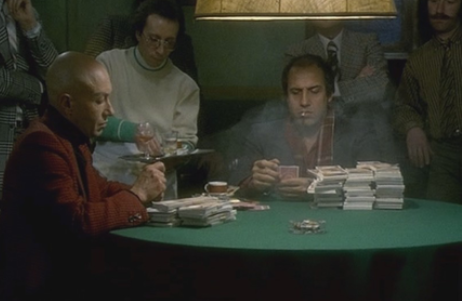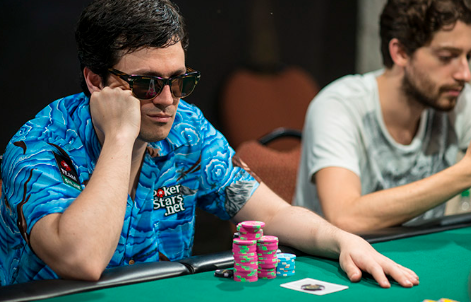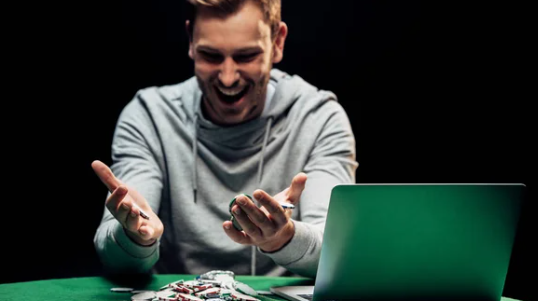Emotions in Live Poker
American psychologist John Hughes shares his methods for recognizing deception at the poker table. Skills in reading your opponents’ emotions will help you improve your chances of winning.
Let’s look at some characteristic behavioral traits and emotions in poker:
Those with the strongest hand experience quite strong emotions when playing poker. At the same time, such a player is usually quieter and calmer than others. They may also behave rather casually, often turning to their left, trying to find out what their opponents are going to do. They may also demonstratively count their chips and fidget impatiently in their chair. Poker and emotions are closely linked, and understanding their interaction can be difficult. We’ll try to explain this using advice from experienced players and psychology experts.

It’s often quite difficult to conceal your emotions; poker is interesting because it trains control and composure. According to experts, one important signal is a change in the behavior of one or more players sitting to your left. Looking at their emotions and poker, it’s better to save money by making tighter calls or, alternatively, calling with two aces.
It’s precisely at the moment when the other players expect a raise that you can set a trap: D. Hughes tells a story about how, during a poker game, two women were sitting next to him. They were fairly good players. Throughout the game, they chatted casually. However, when one of the women had a hand that was worthy of a raise, they suddenly fell silent. Immediately, a shift in the chair was heard – these were emotions, and poker was truly difficult back then. He needed a really strong hand to play well in this situation, because the odds were very strong.
It’s quite difficult to diagnose emotions when playing a poker variant like No-Limit Hold’em, for example, where there are many players and they rotate frequently. Keeping track of everyone is quite difficult.
It’s also worth paying attention to how poker players stack their chips. Experienced poker players carefully conceal their emotions, and their chips are always neatly stacked in tall piles, reminiscent of a fortress. Inexperienced players are immediately noticeable; they’re usually unaccustomed to chips and act insecurely, even with a large number of chips. Everything seems scattered and chaotic (this even manifests itself in something as seemingly insignificant as the placement of chips on the table). After such a player, you can enter the pot with hyped-up hands.

Emotions and poker aren’t always a good combination. Let’s talk about which emotions are beneficial in poker and can make your game more successful.
You should look serious; imagine that you’re thinking very hard about something, regardless of what cards you have and whether this is actually the case. A serious, focused expression and a downward gaze will make it difficult for your opponents to discern your emotions. Folding cards should also be done calmly and emotionlessly, without slowing down or speeding up the pace of play, or making any sudden movements.
One of the most common mistakes poker players make is displaying emotions that are the opposite of their actual ones. Sometimes wearing a hat is helpful; for some players, it helps them discreetly glance at other players’ stacks and keep an eye on the board.
Often, eye contact or a deliberately prolonged pause can mean nothing. This can indicate a bluff, or it can indicate a truly strong hand. To determine what’s going on and what emotions your opponent is experiencing during a poker game, engage them in conversation, ask them if they truly have a strong hand, and what bet they made.
During the flop, it’s especially important to be able to recognize your opponents’ emotions. In poker, it’s not at all necessary to constantly look at the board – sometimes it’s much more valuable to observe the players. A tightening and licking of the lips, a quick twitch of the shoulders, or a slightly raised eyebrow in surprise are all signs of emotion. This indicates that the opponent tried to make a hand but failed, and now they’re thinking about what to do next.
Emotions and poker are a very important topic. Body language in Hold’em, for example, lets you know that the blinds don’t want raises. Their brows will be furrowed, their lips will be pressed tightly together, and their bodies will be leaning forward.
Emotions in poker change throughout every hand. Anger and aggression can manifest quite strongly, and over time, this can become ingrained and manifest itself frequently in your behavior if you’re losing. In this case, it’s best to take a break, grab a bite to eat, and calm your emotions. Poker doesn’t tolerate strong outbursts of emotion or impulsive behavior.
Emotions in Online Poker
What’s important to know about emotions and how to manage them in online poker.
Maintain focus, avoid impulsive decisions, and act strategically even in stressful situations.

Every decision in poker can trigger an emotional response – from the joy of victory to the irritation of an unlucky hand. A player’s main “enemies” are tilt, fear, and overconfidence.
Tilt is a state when emotions overwhelm logic. A player begins making decisions out of anger or resentment, which often leads to a loss of bankroll.
Fear of losing prevents them from taking risks at the right moment, causing them to miss profitable opportunities.
The euphoria of winning can be no less dangerousa – feeling of omnipotence prevents a player from analyzing the situation clearly.
How to control your emotions
Monitor your state. Before a session, assess your fatigue level and mood. It’s best to sit down to play in a good mood. If you’re irritated or tired, it’s best to put the game aside.

Develop emotional awareness. Learn to notice when emotions begin to influence your decisions. A short pause or deep breathing will help you regain focus.
Learn to partially process your emotions. After all, poker is a game of variance, and if you manage your emotions and make mathematically correct decisions, the outcome will be good. Don’t rock that boat inside you.
Record the results of each session. After the game, it’s worth analyzing not only technical issues but also your own emotional reactions – this will help you pinpoint what exactly is causing you to tilt.
Create a comfortable playing environment. A quiet, comfortable, beautiful, clean space, and a lack of distractions help maintain concentration. Bright, good lighting is also very helpful.
Use relaxation techniques. Meditation, breathing exercises, and short breaks reduce stress. Emotional control is one of the most important advantages of a professional player. In online poker, where you can’t see your opponents, it’s inner stability that determines who will stay ahead in the long run. Learn to manage yourself, and your game will become more mindful, stable, and profitable.